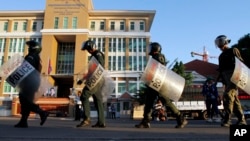International legal experts say a group of laws recently passed in Cambodia to reform the judiciary does little to ensure a balance of powers.
The three laws on judicial reform in fact put a lot of power in the hands of the Ministry of Justice, which falls under Prime Minister Hun Sen’s executive branch, according to a new analysis from the International Bar Association’s Human Rights Institute.
“The Cambodian Minister of Justice has been granted—both in law and in practice—an excessively powerful role in the judiciary, with the capacity to exercise discretion and influence over almost every element of a judge’s career,” the report says. “The scope of the Minister of Justice’s power over the judiciary—including a vast amount of official influence over judicial budgets, resources, training, appointments, promotions, tenure and removal—is now legitimized by the three new laws and is inconsistent with international standards.”
The report comes after a fact-finding mission by members of the association. Brenda Lee Edwards, who helped in the research, told reporters that corruption and bribery continue in Cambodia’s judiciary. That’s a concern, because a functional judiciary requires integrity and propriety, she said.
Judicial corruption in the country is both political and financial, she said, “at virtually every stage of judicial activity.” Even judges in training are required to pay bribes to get the right training, and judges who are members of the ruling Cambodian People’s Party are “favored for appointments or promotions.” The courts are also instructed on their decision-making by the Ministry of Justice and others in the government, which contradicts the constitution, she said.
The three laws were passed in May 2014, ostensibly to reform the Supreme Council of Magistracy; the roles of judges and prosecutors; and the functioning of the court system. They were passed without the presence of the opposition Cambodia National Rescue Party, which at the time was boycotting the government and the legislature, after 2013 elections it said were marred by fraud.
Chak Sopheap, executive director for the Cambodian Center for Human Rights, said the International Bar Association’s report was an accurate account of Cambodia’s judiciary. But she said it makes “constructive recommendations” for reforming the laws, including that the Ministry of Justice not undermine the independence of the courts and that court officials not be members of any political party.
Kem Santepheap, spokesman for the Ministry of Justice, declined to comment, referring questions to another ministry spokesman, Chin Malin, who didn’t pick up his phone. Ang Vong Vathana, the Minister of Justice, could not be reached for comment.








